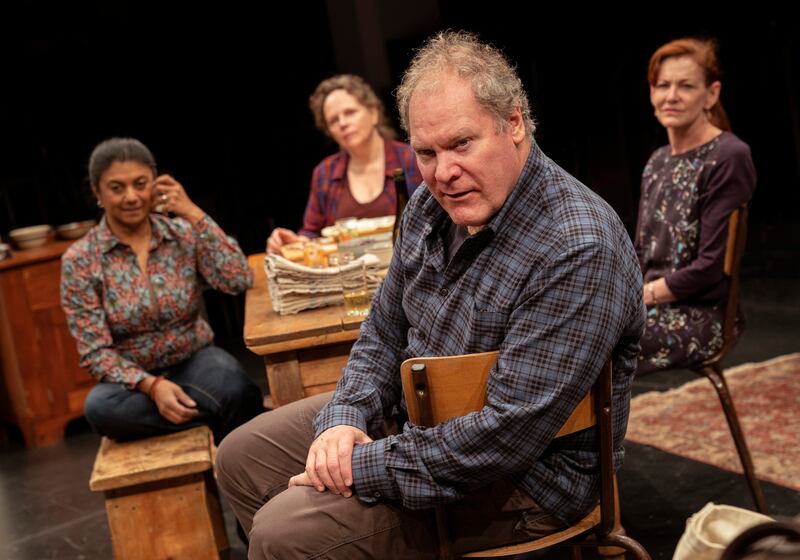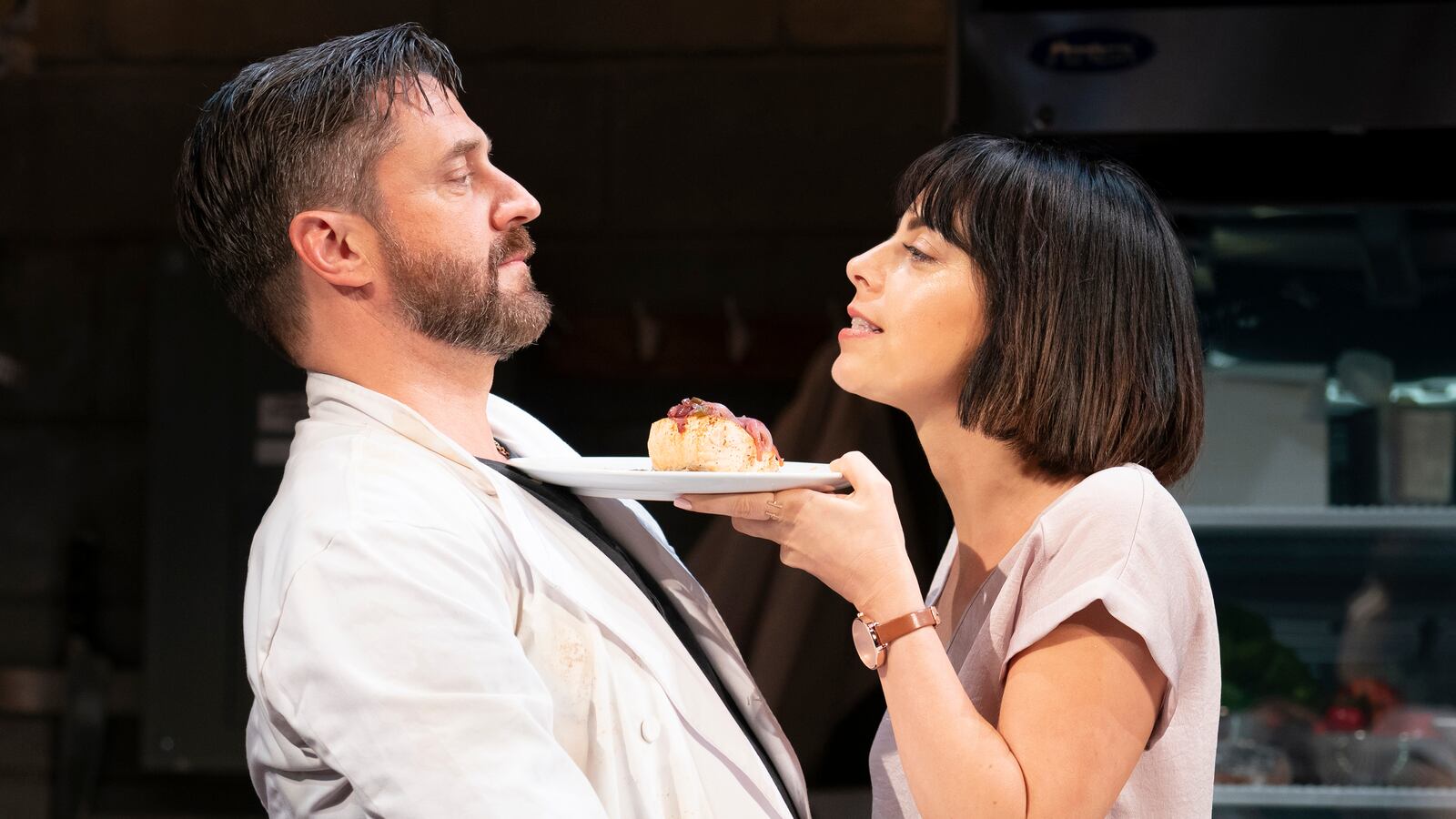Seared
To be blunt: Drop everything and see the MCC Theater production Seared (to December 1). It is one of the best new plays in New York, and a welcome reminder in a dizzyingly packed autumn theater season what fluent, sharp-as-hell writing and alive, intelligent direction can achieve.
In its perfect blending of comedy and drama, revealing what can go very right and very wrong in a Brooklyn restaurant’s kitchen, it deserves to transfer to Broadway, and delight even bigger audiences.
The cult of the celebrity chef has become the general cult of the chef. The scary, exacting, perfectionist tyrant in charge of his or her kitchen has meant that such things as open kitchens are now the norm, where—once reassured about the provenance of your apple tart—you can spy on how the final dish is made, and the fevered concentration and delicate tricks that go into the plating of it.
Harry (Raúl Esparza) is one such chef, and at the beginning of Theresa Rebeck’s brilliant play, Seared, he and business partner Mike (David Mason) and waiter Rodney (W. Tré Davis), have hit it as big as they could want. They have received a small-write up in New York magazine; the writer has mentioned the scallops. Now everyone wants scallops.
The restaurant is also in trouble, and like an angel or devil, here is Emily (Krysta Rodriguez), who “consults,” and who promises she can both save the business and make it prosper.
What follows in this exquisitely funny and dramatic play is a kind of morality tale, in that Rebeck and director Moritz von Stuelpnagel (surely the best-named director in the biz) make Seared both a comedy about Harry’s excesses, demands, whims, and foibles, and also a drama about the same. All those qualities that make a chef so cheffy, Rebeck is very clear, also make them a completely unprofessional nightmare.
There are so many lovely moments in Seared: Harry observing his new knives, and trying them out, as if scythes made of sleek gold, and his assembly of a salmon dish, which begins the second act in complete silence, with a brilliant, surprising payoff at the end of it.
Tim Mackabee’s efficient design is a longitudinal slice of the cluttered kitchen itself, and so we see the other characters quake from Harry’s nuttiness in a line. The door to the main restaurant swings dramatically open and shut after each explosion.
There is no more tense a moment on the New York stage right now—forget Oklahoma! and its gunshots in the barn—than when the dysfunctional Seared quartet must pull together to make a critical meal for a restaurant reviewer, who may or may not be from The New York Times. Your eyes flick to Harry to see what inner and outer lunacy he is engaged in, and then to the other three, on tenterhooks waiting for him to return to planet Earth.
There is seriousness studded in all the chopping and plating furies, as when it is revealed that Harry is sharing Rodney’s tips, and Mike’s utter exasperation at Harry’s intransigence and what it could cost them; and then finally, the price and fallout resulting from Harry's freakout. Rodriguez has in some ways the hardest role to play: she could so easily be written as the villainous interloper bringing evil capitalism to Harry's passion project, but Rebeck respects her job and character as much as the others.
The fight in this tiny space is one for control, but also self-determination and independence. And those qualities, those desires, are not restricted to the capricious Harry, and all four actors lay emphatic claim to their own space to achieve, or at least not to sink because of Harry's maddening behavior.
Harry may not want to make the scallops, and be a bloody show-pony for the foodies at his door, but he is also part of a business. Rebeck does not romanticize Harry, but neither does she demonize him. Indeed, Seared is as generous a play as it is clever, hilarious, and finally piercing.
Oh, and if you don’t eat before seeing it, you will definitely want to afterwards.

The Michaels
Prepare for more food prep as Richard Nelson returns to the Public Theater to play not happy families, or unhappy families, but just families; and The Michaels (to November 24), like Seared, is a beautifully written, finely directed piece of theater.
Nelson has written a number of plays since 2010 (The Apple Family Plays, The Gabriels), which are set on the nights they open. And so it was with The Michaels on Sunday night, with presumably freshly inserted references to the day’s rain and the execution of Abu Bakr al-Baghdadi.
This is a family linked by blood, for sure, but really it is dance that flows through their veins, and specifically, a dance company a trio of the older characters belonged to in the 1970s.
This play, Nelson fans will not be surprised to learn, is not just set in Rhinebeck, but packed full of references to living in Rhinebeck, which will tickle all those who live there too. We sit in the round again, and watch the characters in the kitchen of a family home; a supper is being prepared and the drama takes shape as food is chopped, cooked, baked, and eventually served.
There is nothing outwardly conventional in how Nelson, who also directs his plays, stages his pieces. They feel less like we are watching a play than eavesdropping on a conversation. People talk to each other, but they also talk over each other. This has the feel of a real evening around a real dinner table.
The drama is similarly unconventional and immersing. Rose (Brenda Wehle), the founder of the old dance company, has cancer, and is trying to figure out what to do next. Her partner Kate (Maryann Plunkett) is in charge of all matters kitchen. Rose, tired and then vibrantly engaged, drifts in and out of the action, and she always wants Rose near. They met only recently, and have become quickly devoted.
Her ex-husband (David) is there with his wife Sally (Rita Wolf), herself a former dancer in Rose’s dance company.
Irenie Walker (Haviland Morris), another dancer with Rose’s company, is in attendance too, as are Lucy (Rose and David’s daughter, played by Charlotte Bydwell) and May (Rose’s niece, played by Matilda Sakamoto). The two young women are best friends, and dance a collection of Rose’s dances for her. She approves, and she is also critical, and we applaud their athleticism and craft in such a confined space.
In the spirit of what we are watching, there are no twists, and no dramatic resolutions—Kate tells the group something stunning; it could change both her and Rose’s lives, but it is left hanging in the air, unresolved. Boxes of photographs are unearthed, and smiled over. Wehle has a commanding presence, watchful, vulnerable, and not going quietly into the night anytime soon.
Old passions and loves are aired. Sally really doesn’t like Rhinebeck. Mortality is confronted and evaded. Big questions flare, and only partially answered. All kinds of expressions flit across Rose’s face: joy, fury, suspicion, impatience, frustration, and fatigue. Plunkett’s character is a tower of strength, yes, but not one with limitless devotion to give.
Throughout—in the memories of rehearsing in barns, or performing for ungrateful commuters, of characters like Merce Cunningham, and the pleasure of watching and mounting shows—is the notion that art, in and of itself, is life-giving. Everything flows back to artistic practise and pride.
Nelson’s evening with the Michaels isn’t formless or aimless. In its distinctive way it edges into and out of so many emotional territories and registers; it shows how the epic and everyday can be close cousins; and how the mundane and shattering can unfold as you wash a glass, or bake a quiche.
Barely any of the food is eaten at the end of The Michaels. But then, this very special evening was about the supper and not at all about supper. As an audience member, you will leave feeling marvelously full.







